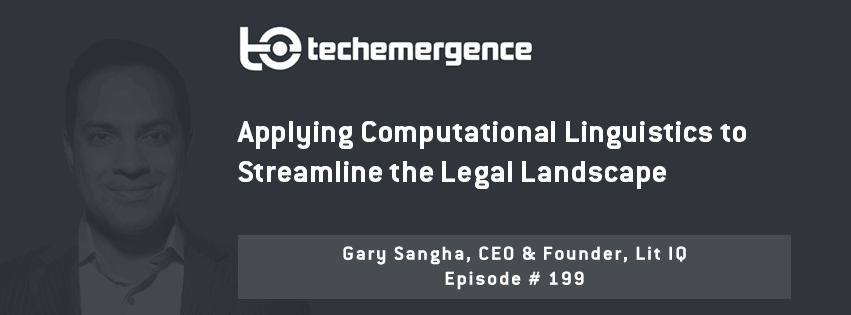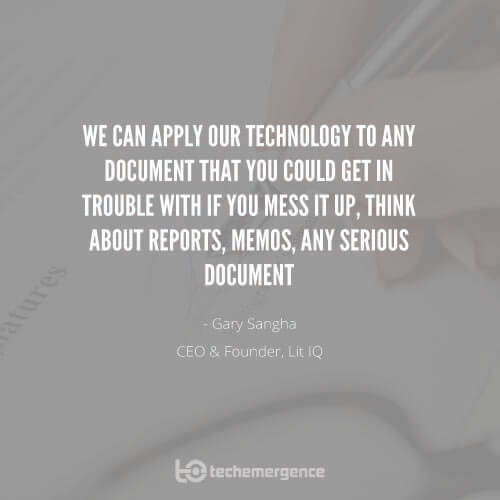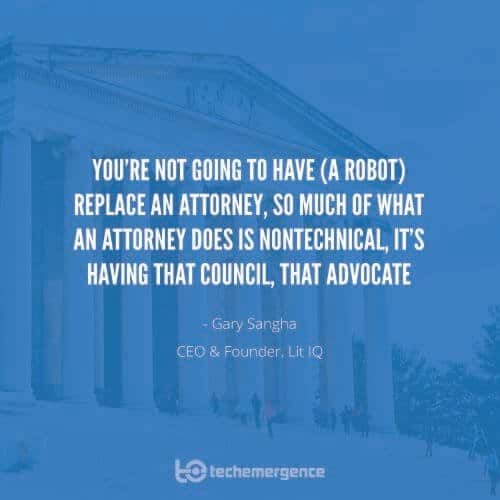
Episode Summary: There’s not that many serial tech entrepreneurs in the legal space, but Gary Sangha is one of them. Sangha is CEO and founder of LitIQ, which is applying machine learning and computational linguistics to legal documents to help lawyers avoid making drafting mistakes. In this episode, Sangha talks about where this type of software is most useful and legitimate, what the legal landscape in relationship to machine learning may look like in the next few years, and how this technology may apply across industries.
Expertise: Law and legal informatics, entrepreneurship, B2B marketing
Brief Recognition: Prior to founding LitIQ, Sangha was a practicing attorney for 10 years in securities law at Shearman & Sterling in New York City and White & Case in Hong Kong. He also founded Intelligize, an information services company that helped professionals more easily research regulatory filing and was acquired by LexisNexis. In April 2016, he was selected by Crain’s New York Business for its 40 Under 40 Class of 2016.Sangha speaks frequently on entrepreneurship, product development, legal innovation and B2B sales. He has been featured in numerous media outlets, including The Wall Street Journal, Barron’s and various industry blogs. Sangha earned his J.D. at the University of Pennsylvania Law School and received a B.A. in Economics and Commerce from the University of Toronto.
Current Affiliations: Founder & CEO of LitIQ, Inc.; Lecturer of Law at University of Pennsylvania; Fellow of CodeX, The Stanford Center for Legal Informatics

Interview Highlights:
(1:25) Give us a brief rundown on what LitIQ’s main value prop is, what are these functionalities you are using now?
(4:25) When we’re talking about errors Gary, what type of errors are detectable (in legal documents)…with the strategies you’ve articulated?
(8:54) Are you able to use previous legal cases to train these models, train these machines, develop your approach?
(10:55) Have you also thought about where else in the world this deeper analysis might eventually make its way?
(13:14) When you look out into the next 5 or 10 years of the legal landscape, what do you see…going away in the legal world, what do you see coming in force in the legal world…given the developments in technology, machine learning, etc.?
(17:23) Is that sort of thing viable in the more distant future, where some of that drafting and writing work…the actual creation…might be machine doable?
(19:14) You had mentioned that, maybe a mergers and acquisition agreement, is twice as long as they were 10 or 15 years ago…why is that? If that is a meta-trend, that’s something worth considering…what has made it that robust and complex?

Big Ideas:
1 – Ambiguities are critical factors in hindering or facilitating law suits, and this is an area ripe for innovation i.e. training machines to recognize low- to high-risk cases of ambiguous language.
2 – The future of legal research, in Sangha’s view, is non-research; in the next 10 years, lawyers may no longer need to search for countless hours through a database, but will have systems and software that can analyze documents and provide the information more quickly in a succinct format (read about Casetext’s related approach of using machine learning to provide access to legal documents).











